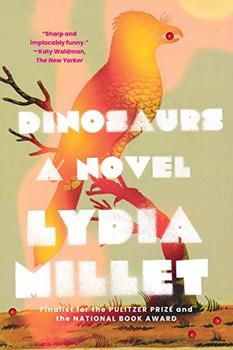Summary | Excerpt | Reading Guide | Reviews | Beyond the Book | Readalikes | Genres & Themes | Author Bio

A Novel
by Lydia Millet
From his place you could see most of its interior, except for the bed rooms and bathrooms. It was laid out in an open plan: entry, living area, dining area and kitchen. On the side facing his house, the wall was one long stretch of glass.
On the other side, in the bedrooms, there were regular picture windows. He was the only neighbor with a view of the glass-walled stage.
He'd asked himself who would choose to live there. On display.
But he was still getting used to the air and silence of his house—older than the glass one, with such spacious rooms and high ceilings that he thought of it as a castle—when a family of four took up residence there.
A husband, a wife, a girl, and a boy.
He lived by himself. So it was hard not to look at them. At first they seemed like a group of mannequins to him, in a high-end department store window.
Say Bloomingdale's. Or Saks.
MAYBE PRIVACY JUST MATTERED LESS to the family, he thought, than what you could see from within. The glass wall was equipped with remote-controlled screens—the realtor had shown him their quiet movement—that rolled down to keep out the heat, protecting the house from the desert summer. At the end of a hot day you could press a button, if you liked, and raise the screens again.
That way you could watch the sun rise in the morning. And in the evening, from the windows in the west-facing bedrooms, you could watch the sun set.
At night the indoor lights made the glass house into an even brighter theater, its colors and figures vibrant against the surrounding dark.
The parents were slightly younger than he was, he guessed. Late thirties or early forties, possibly. The woman was blond and wore her hair up in an elegant roll when she went out, taking it down with one deft hand at the back of her neck when she came in again. The man was tall and had chiseled features, a sweep of black hair on his high fore head, olive skin.
The little boy was his father in miniature, and the teenage girl resembled her blond mother.
ONE AFTERNOON HE NOTICED the wife moving around in the kitchen—it was a cloudy day and the screens had been raised. When he sat down to read a book in his favorite armchair, and looked up from the page, he could glance through a gap in the drapes of the window beside it and see the full sweep of the open plan.
Idly he watched her stretch out the end of a roll of silver foil, rip off a neat sheet. She covered something in the foil, then gestured to the children—the boy, who sat building Legos at the dining-room table, and the girl, who roused herself from a couch in front of the TV.
The three of them went out their front door, the wife carrying her foil-wrapped plate, the children lagging.
They walked down to the sidewalk and turned toward his own front yard. Then up his front walkway.
For a second he felt trapped. Not ready for a meeting.
He looked down at his feet: one sock had a hole at the big toe.
But they had to know he was home—his car was parked in the driveway. If his car was here, he was here. Phoenix was built for cars, like LA. You barely moved without them. Buying a car had been his first act, when he arrived. In New York he'd never needed to own one.
They rang the doorbell, so he shoved on his shoes and went to the entryway. On the screen of the security console he could see them—the wife smiling up at him, the tops of the children's heads behind her, indistinct.
Damn, was his thought, and he felt his pulse quicken. Alarm, but also a sliver of anticipation: it had been a dull sequence of days.
And opened the door.
The wife, who was even more elegant up close, said what friendly neighbors said in TV shows from the fifties.
It was a peach pie. She hoped he liked it—she was a mediocre cook, but when it came to baking you just followed the recipes.
Excerpted from Dinosaurs: A Novel by Lydia Millet. Copyright © 2022 by Lydia Millet. Used with permission of the publisher, W. W. Norton & Company, Inc. All rights reserved.
Your guide toexceptional books
BookBrowse seeks out and recommends the best in contemporary fiction and nonfiction—books that not only engage and entertain but also deepen our understanding of ourselves and the world around us.